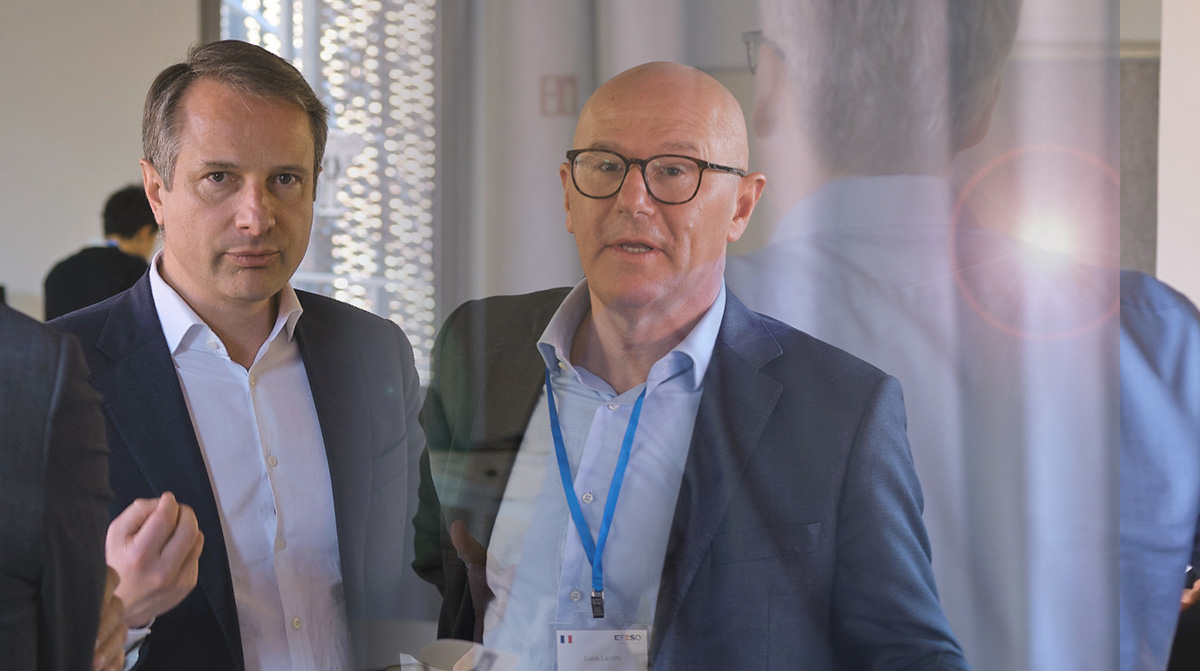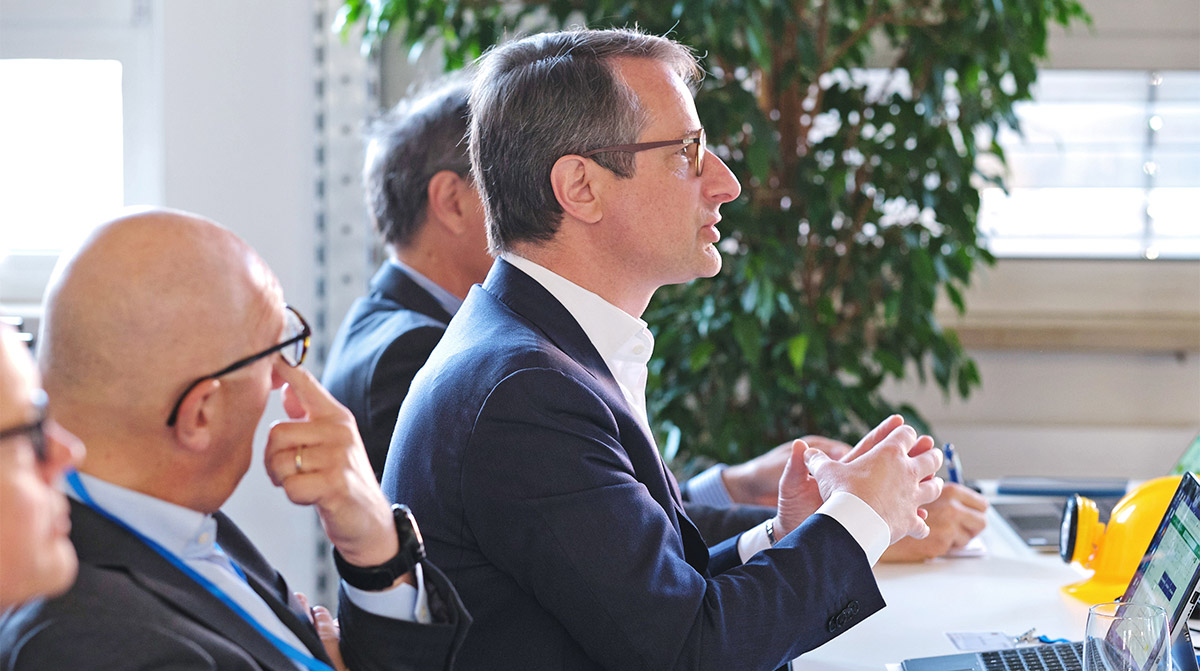THEMEN & NEWS
Beiträge und Interviews zu aktuellen Fach-, Technologie- und Branchenherausforderungen, Informationen zu unseren Beratungsangeboten, Seminaren und Events sowie Unternehmensthemen:
Hier erfahren Sie, was EFESO bewegt.
"GLOBALIZATION IS STILL ALIVE"

INTERVIEW
Bruno Machiels and Luca Lecchi, Co-CEOs
Bruno, Luca, EFESO helps companies on all continents improve performance, achieve operational excellence and master digital transformation. How do you look at the evolution of globalization?
Bruno: When you talk about “globalization” you can look at it from two different angles. “Global” as “the same everywhere,” and “global” as “boundaryless luidity all over the planet.”
Luca: If we start with “the same everywhere,” it is clear that there are still tremendous differences between these places. Even if at the global headquarters it is something that tends to be forgotten, local, physical and social environments dictate real operational and consumption differences. Transportation is quite different with high velocity infrastructures than without. Production will always remain dependent on available energy type, reliability and costs. Performance management is totally different in the functioning of political, cultural and social practices. Quality and productivity are influenced heavily by physical conditions as well as supporting infrastructures. Investments and liabilities are a totally different ball game in the functioning of local bureaucracy and political interference. So even dentical industrial set-ups will have to work totally differently to function in their environment.
Bruno: At the same time, we see a growing ability of units in very different environments to adopt quicker new levers for performance. Digitalization plays a major role in this, as it facilitates collaboration and reduces the cost and lead time of the transfer of information, knowledge and skills. That’s why the current growth of “digital curtains” in some geographies is such a value destroying obstacle. They impact negatively not only the functioning of multinational organizations or supply chains, but also the ability of those living behind these curtains to seize and exchange improvement levers. We see a growing similarity of challenges in different geographies. The challenge to master and exploit the power of digital. Or the challenge of becoming more sustainable. Even if these challenges have still a different degree of importance in different geographies, and are at a different maturity level, it is remarkable to see how they are increasingly added to the agenda everywhere.
Luca: Another rising global challenge pertains to speed and complexity. As lifecycles of consumer taste, products, technologies, etc., become increasingly shorter, the expected value and quality – including ones like “connectedness” and “sustainability” – trigger higher levels of complexity and new ways of organizing the end-toend value chains. Less sequential, more integrated, more iterative. So, regarding “global” as “everywhere the same,” we should be able to admit that because of substantial physical and social differences, full standardization and identicality are perhaps not an ambition as such. At the same time, the ability of multinational organizations to get the best out of local situations, empowering and enabling local progression thanks to their collective capabilities, has never be more important. Quality of constructive and disciplined collaboration, and inclusion of different cultural backgrounds and angles are key here.
We see the challenge to master
and exploit the power of digital.
And what about the global supply chains?
Bruno: If we look at “Global” as “boundaryless fluidity all over the planet,” we just crossed a pivotal moment. Many of us had embraced the belief that global supply chains where natural, especially when boosted by the power of digital. Basically, the economic logic of specialization – produce where you have the highest productivity/lowest cost – totally overshadowed some fundamentals of risk management based on portfolio thinking, based on the hypothesis that we live in a stable world and that strong multilateral commercial exchanges would render conflicts unattractive. Over these last recent years, however, the physical and social realities suddenly resurfaced, teaching us hard lessons. COVID, Suez-canal interruption, wars, etc., all reinforced by growing geo-political multi-polar rivalries, and new competition for some resources like rare metals. The basic platform of trust necessary for global supply chains suddenly weakened, or even disappeared.
Luca: On one hand, we see a growing regionalization of supply chains. We could even imagine that there is some overreaction now. What should be a correction or re-equilibration of risk, sometimes looking like a very black and white course of action, will not be sustainable in the long term. Business is about taking calculated risks. International supply chains are part of those risks. You try to determine what type of risk makes sense for you, but maybe with a larger and longer-term view than before. We also see growing regionalization of scope. Companies clearly stepping out of some geographies, even at a high cost. Depending on each case, this can be about leaving a non-level playing field not considered as fair, reducing reputation risk, or even long overdue refocusing. It can once more be triggered by the need to reduce complexity.
Bruno: But this does not mean the “end of globalization.” Many pull-outs are for example rather footprint rearrangements. New origins and destinations are growing. Some resources and products will still be needed to travel throughout our planet. Footprints become more complex tradeoffs between economic advantages, market needs and geopolitical risks. And yes, more friction will exist between some geographies. Making global supply chains work requires once more very professional collaboration. And with growing cultural tensions, it becomes even more important to develop this ability to be able to manage differences constructively.
This dimension of collaboration comes back regularly. Why is it so important?
Luca: Very few companies now work without any type of “international” exposure. The war in Ukraine regretfully illustrates this point. It triggers big issues in, for example, the food and beverage industries, in the automotive industries, in the chipmaking industries, in the IT departments of many other industries. How many people really knew about that before the war started? Every international enterprise requires collaboration, one way or another. Taking into account the growing complexity and time pressure, traditional customer-supplier relationships are becoming increasingly obsolete as collaboration is required at a much deeper level.
Bruno: We live increasingly in a world of deep specialists. And these specialists are not naturally good at working together with other specialists. Developing the ability to work together in networks, to integrate in different teams, to build and orchestrate ecosystems, to align productively talent, becomes a core challenge in our world. Add the cultural dimensions to it, and your challenge, or potential competitive advantage, takes on an even bigger dimension. Building teams with different profiles and cultural diversity that work together successfully and resolve tensions constructively is very complex. There is a high risk that they will disintegrate into regional or professional fragments and ultimately work past each other rather than with each other. Counteracting this is a prerequisite for the future viability of companies.
Luca: The ability to build strong cross-cultural and cross-functional collaboration becomes a key differentiator. And it is not just grown and anchored through soft approaches. It requires a deep adoption of the reason for collaborating, and the coherent alignment of many company dimensions. Such as, for example, the upgrading of management practices, single agendas, reinforcing leadership behaviors, etc.
The ability to build strong cross-cultural and cross-
functional collaboration becomes a key differentiator.

Sustainability and globalization also seem to have strong connections. Can you elaborate on that?
Bruno: Sustainability is increasingly driving business agendas in general. It touches the two dimensions of globalization in many respects. It influences where you can be active, and how you should behave there, e.g., in terms of labor conditions, environmental impact, contribution to local communities. It also influences supply chains though, for example, their Carbon Footprint. But globalization should not automatically be considered an enemy of sustainability. Take, for example, this impressive project driven by Port of Antwerp-Bruges: setting up supply chains to use the sun where most appropriate to produce hydrogen, and then transport the hydrogen to Europe to provide clean fuels. You indirectly import the green power of sunlight.
Luca: Sustainability is already strongly influencing the global footprint of companies. Not only because of regulatory pressure, or voluntary ambition. But also because of climate change. Climate change will alter the relevance of some of the existing footprints, because of, for example, resources no longer being available. Climate change is also already altering the supply chains themselves.
Bruno: So, in a nutshell, globalization is still alive. There probably even exists a more acute sense of being part of the same planet than ever before in human history. But realism, and the consequences and/or less attractive sides of humanity, are profoundly changing the way we should look at business globally.Reaching a much higher level of collaboration maturity will be a must have, at the business level, at the political level, and before all plainly at the human level.
“Globalization should not be
considered automatically as
an enemy of sustainability.”




